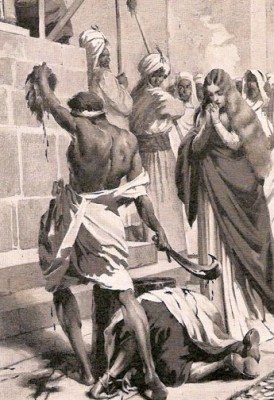I believe in the Christian gospel, I really do. To me, Jesus is the light of the world (Ego sum lux mundi, as it is written in Latin), the alpha and the omega. You don’t need to preach to me, sisters and brothers, because I already believe. Not only do I believe in the Lord, I trust in him. Having stated my views in a positive manner, I will now do so negatively. What do I not believe? Many things, but most specifically Islam. I do not believe for a moment that God gave Mohammed a revelation in a cave on a mountain called Jabal al-Nour near Mecca in the 7th century. To the extent that this purported heavenly disclosure refutes the gist of the Christian faith—that Jesus was the son of God, that he performed unprecedented miracles, that he lived a sinless life and that he rose from the grave after three days—I simply do not buy it. While I respect all persons and most cultural traditions, I’m no Muslim.
By the same token, I am neither a proselytizer nor a Biblical scholar. I could not tell you what it says in First Corinthians 3:17, choosing a random example, to save my life. While I have no original or deep spiritual insights, I read history voraciously and have picked up a few things along the way. We Christians have made our share of mistakes. St. Paul’s admonition that slaves should submit to their masters is one, the conflation of sex with sin is another, and the Spanish Inquisition is a third. Catholics and Protestants have too often been at each others’ throats. OK, we have screwed up in some big ways.
The fact remains that we have a living savior. And for him to be abjured or called a mere prophet upsets me. It will seem hopelessly retrograde if I admit that upon seeing Mohammedan people here in Seoul—women with scarves on their heads, and so on—I mumble to myself, “Damn infidels.” I sometimes pray that their eyes will be opened. Whenever I hear about a Christian who has apostasized and become a Muslim, I am horrified. How? Why? Never for me, never in 5 million years.
I realize that as I have gotten older, my attitudes have hardened. The murderous infidels who attacked the USA on September 11, 2001 were just part of it. No, this took place over a period of time. I recall the piece I wrote in 1983 for Third Coast magazine about the house two blocks west of the University of Texas campus that had been converted into a mosque. As part of my journalistic duties, I spent a few hours there. I did interviews, observed the guys (gals were next door) genuflecting to “Allah” in the direction of Mecca and listening to sermons in Arabic. Those I met were, for the most part, friendly, smart and likable; I say so without qualification. I concluded the article with a quote from the Lebanese man in charge: “When Islam comes again, it will be from the west.” I did not know quite what it meant, but it sounded good and I used it. With the perspective of 33 years, I should have written differently or on another subject.
I hate to oversimplify and re-state what has been said numerous times before, but here goes: Islam is inherently violent. From a spot in the Arabian desert, it spread throughout the Middle East to Europe, Asia and Africa virtually overnight by means of the sword. Take a look at the flag of the Kingdom of Saudi Arabia. It has some text from the Koran and guess what—a sword. The Koran says there should be no compulsion in religion, but most people (whether Christians or Jews or Zoroastrians or pagans) who got in their way were allowed to choose between conversion and the sword. Take your pick.
Two of my favorite historical figures are Charles Martel and John III Sobieski. Martel first. After the Arabs and their Berber co-religionists had taken Spain and half of France, they met their match in Martel and his band of French fighters at the Battle of Tours in 732. Had they failed…. Well, I shudder at the thought. The Muslims were defeated, but they would be back in western Europe. Sobieski forged a military coalition that repelled the invading Turks at the Battle of Vienna in 1683. Martel and Sobieski have my sincere gratitude.
And finally there are the Cordoba martyrs. Most of the Iberian peninsula had accepted Christianity while still part of the Roman empire. The roots of the faith were deep. But an Arab raiding party crossed the Gibraltar Strait in 711, and just eight years later domination had been established. Christians and Jews who survived were put in a humiliating second-class status called dhimmitude. A non-Muslim who made a public statement of faith was signing his own death warrant. Nevertheless, between 850 and 859, forty-five people in the city of Cordoba boldly asserted their Christian faith or refuted Islam. They were monks, nuns and lay people—even a few young girls. All were beheaded, their bodies unceremoniously tossed into the nearby Guadalquivir River or to the dogs. I will name some of these admirable souls: Sisenandus, Natalia, Leovigild, Jeremiah, Leocritia (also known as Lucretia), Columba and Eulogius.
They gave courage to others early in the 700-year Reconquista of Spain by which the infidels were driven out.


Add Comment